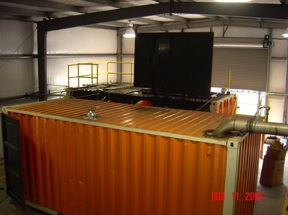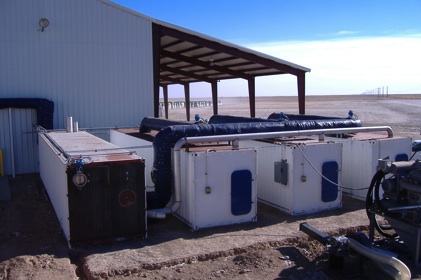
 Aug. 18, 2009 — One person’s trash is another person’s treasure, or
Aug. 18, 2009 — One person’s trash is another person’s treasure, or
environmentally friendly fuel source. Senreq LLC engineers waste gasification systems. Using any source
of waste as a feedstock, its units can produce significant heat for a
greenhouse.
Aug. 18, 2009 — One person’s trash is another person’s treasure, or
environmentally friendly fuel source.
Senreq LLC engineers waste gasification systems. Using any source
of waste as a feedstock, its units can produce significant heat for a
greenhouse. It’s estimated 64 tons of municipal solid waste can provide 476
gigajoules of energy per day. “That is enough to meet peak demand for a 12-acre
poly range in southern Ontario,” notes Canadian company president Dan
Vanderburg.

|
|
This Advertisement
|
A
typical ton of garbage contains about 9.5 gigajoules of energy, and the Senreq LLC system can deliver 70 per cent of that to
the customer in the form of hot water.
The system also has the capability to sequester liquid carbon
dioxide for use in the house and resale on the market. The company offers a
range of ownership packages.
Gasification
of solid waste is an emerging technology based on simple physics. Gasification
has been in use for over 100 years. The current waste management issues, and
energy costs in North America, have encouraged waste-to-energy technologies to
come to market. “Senreq has refined the process, developed several patented
processes, and brought to the market an environmentally sound, and economically
viable waste to energy system,” says Vanderburg.

|
|
This Advertisement
|
The
greenhouse industry is a particularly symbiotic mate for gasification.
Municipal solid waste (MSW) is readily available as a primary feedstock. Liquid
carbon dioxide can be sequestered and sold on the open market. The energy is
recovered in the form of hot water, and can be integrated into existing hot
water storage tanks. As well, the grower can dispose of all on-site waste,
including vines, lunch room waste, and packaging, among other materials.
Gasification
is a win-win system. Utilizing MSW as a feedstock mitigates landfilling, but it
also provides the grower with an additional revenue stream.
Senreq
says the emissions are well below the new Canada-wide standards, as well as
Ontario Guideline A7.
For more information, contact Dan Vanderburg at 705-879-2414,
or e-mail dan.vanderburg@senreq.com.
Print this page